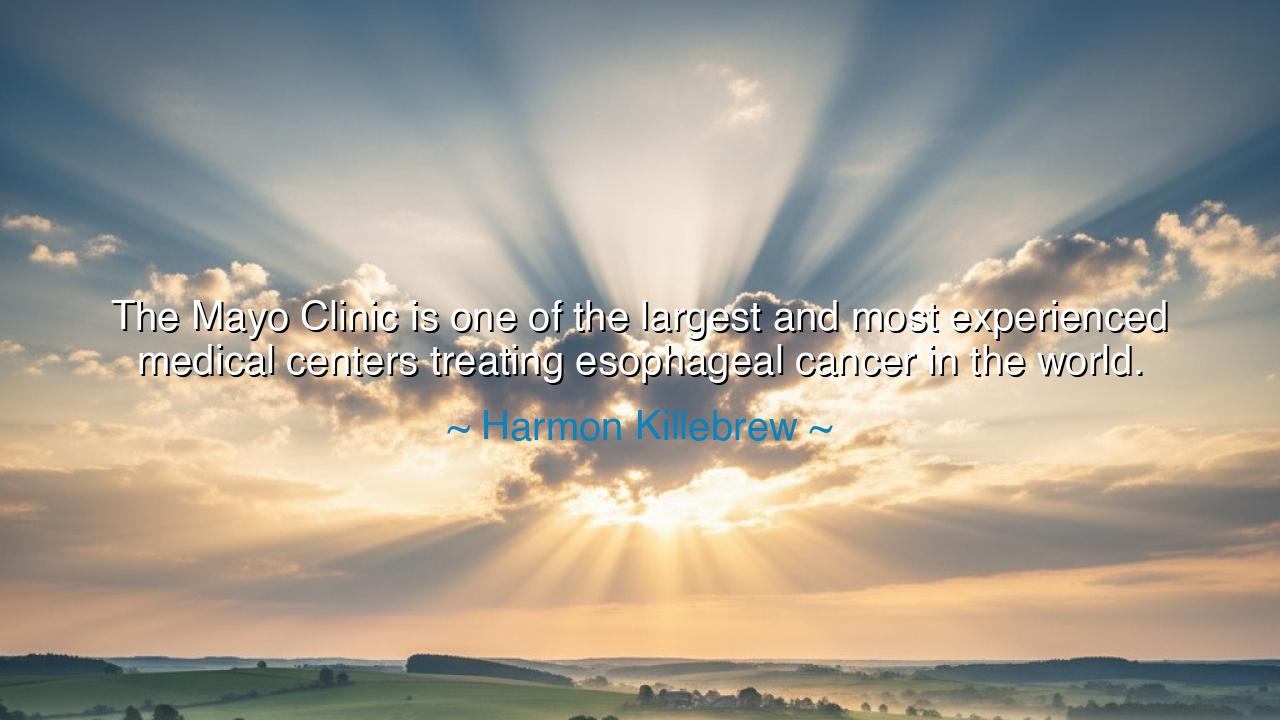
The Mayo Clinic is one of the largest and most experienced
The Mayo Clinic is one of the largest and most experienced medical centers treating esophageal cancer in the world.






In the realm of human suffering and healing, there are places of profound significance, where the wisdom of ages meets the cutting-edge of science and compassion. Harmon Killebrew, in his acknowledgment, speaks of one such place: "The Mayo Clinic is one of the largest and most experienced medical centers treating esophageal cancer in the world." His words bring to light a truth that transcends the individual—the Mayo Clinic is not just a medical institution, but a symbol of the power of knowledge, experience, and dedication to the healing arts. It stands as a beacon of hope for those suffering from one of the most challenging diseases known to humankind.
In the ancient world, healing was considered not only a physical act but a sacred duty. Asclepius, the Greek god of healing, was revered by those seeking remedies for ailments of the body. His sanctuaries, known as Asclepiions, were not just places for the sick to seek relief but centers of wisdom, where healing was intertwined with philosophy, and science with spirituality. The concept of healing, then, was seen as an art practiced by those who not only understood the body’s intricacies but also the heart and soul of the person in need. The Mayo Clinic, much like the Asclepiions, has become a modern-day center of healing, where the ancient principles of care and the latest scientific advancements are brought together to provide relief and hope.
Consider the example of Hippocrates, the father of medicine, who believed that healing was rooted in understanding the whole person, not just their disease. His approach to medicine was grounded in diagnosis, observation, and humility, knowing that the best treatment for a patient arose from a combination of knowledge and compassion. In much the same way, the Mayo Clinic applies its vast experience not only through technical expertise but through a deep commitment to personal care, where each patient is treated as a unique individual. This commitment is part of the Clinic's legacy, ensuring that the wisdom of its practitioners reflects the moral and ethical responsibility to the individual’s well-being.
Esophageal cancer, a disease that strikes with silent ferocity, requires not only expertise but innovation in treatment. The Mayo Clinic has become a leading authority in this field, offering advanced treatments that push the boundaries of what is possible. The ancient healers, much like today’s medical practitioners, were not satisfied with stagnation but sought to discover new ways to heal and prevent. The legacy of great medical minds like Galen and Avicenna, who expanded knowledge on the body’s functions and remedies, lives on in institutions like the Mayo Clinic, which continually strives to improve and expand the frontiers of medical science.
In every civilization, there were places that symbolized the convergence of knowledge, expertise, and compassion. Rome had its Baths of Caracalla, places not only for relaxation but also for healing, where the collective wisdom of medical practitioners served the entire empire. Today, the Mayo Clinic serves a similar role, bringing the best of modern medicine to those suffering from complex diseases like esophageal cancer. The Clinic’s reputation has been built not only on its size or scope but on its commitment to innovation, research, and a patient-centered approach that honors the legacy of its founders.
The lesson to be learned here is clear: the greatest institutions are those that combine the wisdom of the past with the advances of the future. They recognize that healing is not just about treating a disease but about treating the whole person—physically, emotionally, and spiritually. Just as the Mayo Clinic has become a beacon of hope for those facing the daunting challenge of esophageal cancer, so too must we all strive to be sources of healing and support in our own spheres. The best care comes from knowledge shared, compassion given, and commitment to improvement, just as the ancients did, and as modern healers continue to do.
In your own life, ask how you can embody this approach: how can you integrate knowledge with compassion? Whether in your work, your relationships, or your community, seek to bring the best of your skills and understanding to those in need. Just as the Mayo Clinic demonstrates, our duty is to serve others with the gifts we have been given, ensuring that our actions reflect the highest standards of care, integrity, and service. In this way, we not only heal but transform the lives of those we touch, building a legacy that lives on through the generations to come.






AAdministratorAdministrator
Welcome, honored guests. Please leave a comment, we will respond soon